Does this sound familiar? “The American people are turning us off. They’ve been clobbered by Vietnam, Watergate, the inflation, the depression. They’ve turned off, shot up … the American people want someone to articulate their rage.” And how about this? “There is no America. There is no democracy. There is only IBM and ITT, and ATT and DuPont, Dow, Union-Carbide and Exxon. The world is a business … it has been ever since man crawled up out of the slime.”
Change the historical events, change the names of the conglomerates, and these speeches could have been written yesterday morning about, or by, President-elect Donald J Trump. He is Network screenwriter Paddy Chayefsky’s nightmare made real, his blistering satire come completely true just in time for the film’s 40th anniversary this week. If Trump hadn’t settled on Make America Great Again for a slogan, he could have easily run on “I’m as mad as hell and I’m not gonna take it any more!”
Network is like a time machine: when it was released four decades ago this week it more or less accurately predicted the state of media as it is 40 years later. It mourns the original golden age of television – the 1950s – of which Paddy Chayefsky was a major and emblematic figure, but it partakes of all that era’s shortcomings, too: overstatement, speechifying, ranting, self-indulgent writing, sledgehammer subtlety.
It also, nonetheless, looks startlingly like a work that would fit snugly into the current golden age of television alongside shows like The Newsroom and Studio 60 on the Sunset Strip. The creator of those shows, Aaron Sorkin, even went so far as to invoke Chayefsky when he received his screenwriting Oscar for The Social Network.
Network’s most famous virtue is its extreme and eerie prescience about where the news media would go in the next decades. Howard Beale, “the mad prophet of the airwaves”, lurks behind any number of real-life media ranters and screamers of our own time, from Bill O’Reilly to Sean Hannity, Glenn Beck to Alex Jones.
Faye Dunaway’s carnivorous network suit Diana Christensen – Sammy Glick via Tracy Flick – is derived from young TV execs of the 1970s who were accused of infantilizing the medium. People like NBC daytime programmer Lin Bolen and Fred Silverman, who serially headed all three networks, in particular. Network takes the side of the old against the young, seeing youth as a destructive, insatiable, Darwinian force that will ultimately usurp William Holden’s ageing newsroom chief Max Schumacher.
Nobody wants news any more, says Christensen, as she ruthlessly lays out a template for the coming age of “disinfotainment” and canned news-porn. The first step of which is to bring the independent news division under the heel of network entertainment programming. What Shumacher dreams up in a drunken haze as a joke, she makes reality – or reality television, as it had yet to be known.
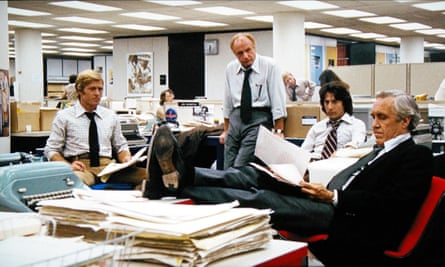
Another of Network’s accidental byproducts is the nostalgia one feels right from its opening shot of four TV network news anchors – three real, one fictional. In those pre-Fox years, of course, there were only three networks, and they underpinned what was left of the American consensus after Goldwater and Nixon, Vietnam and Watergate. It is a pre-digital realm of rotary phones, filing cabinets, steno pads and typewriters; the newsroom is an exact match for the newsroom in All the President’s Men, also released during the bicentennial, and the idealistic yin to Network’s pessimistic yang.
And the mid-1970s was almost insane enough to obviate satire entirely. Network is embedded in the very real world of 1975, satire notwithstanding. We hear of “the Lennon deportation”, the two recent assassination attempts on President Gerald Ford, the Opec price hike, and the Patty Hearst kidnapping. Indeed, the movie mentions multiple heiress-terrorists and offers us one of its own, played by Kathy Cronkite, daughter of Walter, America’s most trusted anchorman.
Forty years later, Network is half a masterpiece. At more or less the one-hour mark, right after the mad-as-hell speech and 60 minutes of very sure-footed satire, it loses all steam and caves in on itself. Chayefsky falls prey to all the spell-it-out vices of the golden age of television, and one can imagine it all in black-and-white, being broadcast in 1956. Character names aren’t exactly subtle: Robert Duvall’s shark-like executive, prone to budget-slashing, is named Hackett, while the affair between Dunaway and Holden plays like bad Philco Playhouse dross.
Everybody gets a chance to yell at great length, and with the exception of Duvall (who is here turned up to maximum Charlie-Don’t-Surf!), few of them carry it off well. Even Mr Jensen’s apocalyptic bollocking of Peter Finch (“Valhalla, Mr Beale, Please sit down …”) seems faintly risible now. And the dialogue betrays a working-class autodidact’s over-fondness for Big Words: “multivariant”, “auspicatory”, “eraculate”, “intractable and adamantine”!
Chayefsky, a creature of postwar television, despises what it has become (he’d quit TV in disgust in 1960). The young are all vacant, amoral gargoyles. The black characters are near-racist caricatures puking up demented Marxist-Leninist verbiage while eating fried chicken and cradling machine guns. Satire repeatedly merges with spite and contempt – for characters and audience – putting Network up there with A Face in the Crowd in the never-ending war between Hollywood and upstart television.
But still, there is that breathtaking, unnerving prescience, which makes one sorry that three of Network’s principal architects – Chayefsky, Finch and Holden – were dead long before it became apparent. And there is this, from Finch-Beale, a line that reaches straight across 40 years of time and grabs us by the throat: “This tube is the most awesome goddamn force in the whole godless world, and woe is us if it ever falls into the hands of the wrong people!” Perhaps it’s too late.
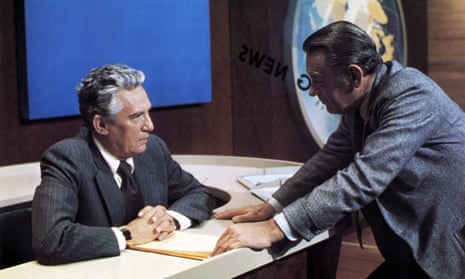



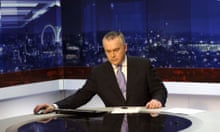
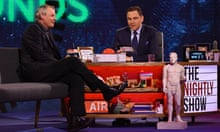

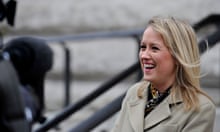
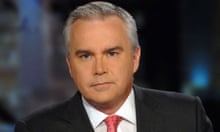
Comments (…)
Sign in or create your Guardian account to join the discussion